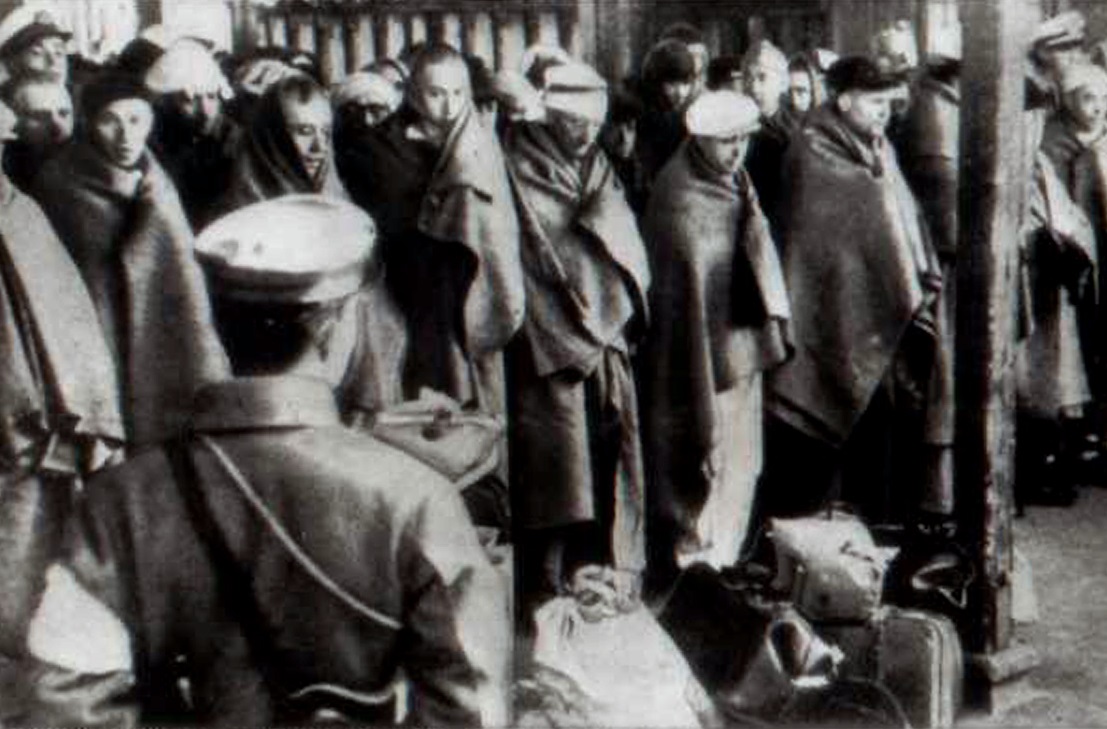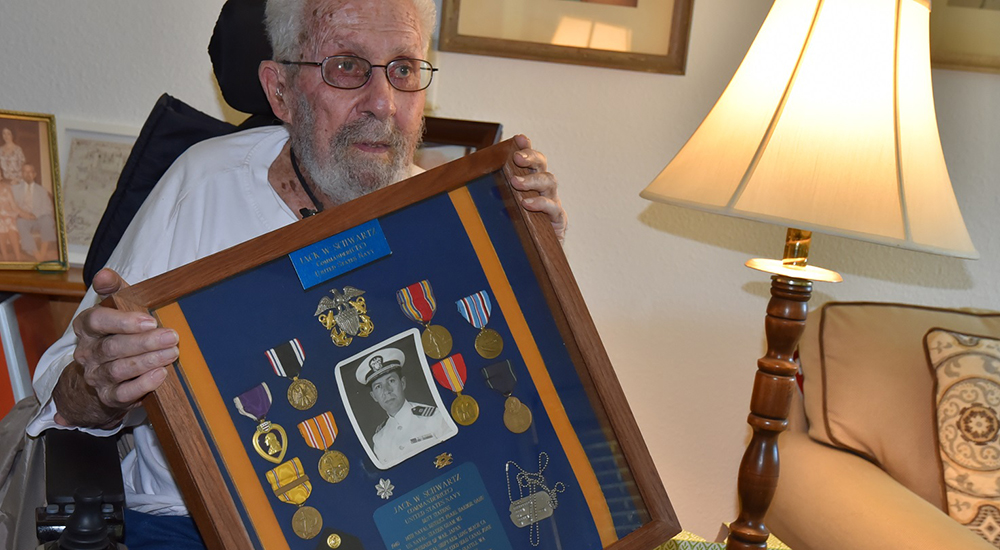Whatever doesn’t kill you only makes you stronger. For retired commander Jack Schwartz, that seems to be the case.
The 22-year navy Veteran spent 1,367 days in captivity as a prisoner of war during World War II. He turned 103 years old April 28.
For Schwartz, it all started just three days after the Japanese bombed Pearl Harbor. On Dec. 10, 1941, he was a navy lieutenant junior grade stationed in Guam as a civil engineer responsible for the water supply, roads, the breakwater and some construction.
Former World War II prisoner turned 103 years old on April 28
“We only had 100 marines on the island – about 400 of us total, to include those who worked at the naval hospital,” Schwartz said. “And there were about 4 or 5,000 Japanese soldiers. They sank one of our ships, a mine sweeper, and nine sailors were killed.”
“We didn’t put up much of a fight.”
Schwartz said he was held by the Japanese there in Guam for about 30 days.
“There was plenty of food on Guam, but they deliberately starved us to make us weak,” he said.
After 30 days, they were transported by ship – all 400 U.S. POWs to include Schwartz – to Shikoku Island in Japan. They stayed there for about eight months, in some old barracks left over from the Japanese war with Russia, before being moved again.

In this Japanese propaganda photo released in March 1942, U.S. service members from Guam arrive at Zentsuki POW camp on Shikoku Island in Japan. Jack Schwartz was one of about 400 U.S. POWs captured at Guam and taken there.
The next place Schwartz was sent to was Kawasaki, between Tokyo and Yokohama. There were already POW camps and prisoners there when Schwartz including U.S. service members captured in the Philippines and from U.S. ships.
More than 300 prisoners were there, but just a few were officers, he said.
“I was the senior U.S. officer there so they put me in charge of the camp,” Schwartz said. “As a prisoner, I had absolutely no authority to do anything, but if anything went wrong it was my fault.”
“Every month or two I got a beating by the Japanese guards – nothing too serious – just to show me they’re in charge.”
After two years, Schwartz said he was sent back to Shikoku Island to the same POW camp he was at previously.
“This was a camp for officers – not just U.S. but English and Dutch. This was where the Japanese would invite the Red Cross to show how nice the conditions were,” Schwartz said. Schwartz would be separated, segregated and moved several times before the Japanese finally surrendered to the Allies on Aug. 14, 1945.
“The day the war with Japan was over, a Japanese officer lined us up outside and told us hostilities have ceased,” Schwartz said. He and the other Japanese officers and guards just walked away.
They made a big sign in white paint on the roof that read POW. After a couple of weeks, a U.S. B-29 bomber spotted us, and a few hours later they started dropping parachutes full of food. “Naturally we all started stuffing ourselves and got sick.”

POW Jack Schwartz, World War II POW from Dec. 10, 1941 to Aug 14, 1945, pictured here at Kawasaki POW camp, Japan.
Upon release – after being held POW for 3.75 years – Schwartz made the decision he would not end his career with the Navy and instead, he continued serve for another 18 years.
The Caltech graduate – who was born in San Francisco but moved to Hollywood with his parents at an early age – would eventually retire from the Navy with honors and distinction and move to Hanford, Calif., in 1962. He then worked for 18 years as Hanford’s Public Works Director and city Engineer before retiring a second time.
Schwartz said he now receives his medical care from the VA Central California Health Care System and is treated very well. “I still remember my first doctor there at the VA, Dr. Ron Naggar. And Dr. Ivance Pugoy is one of my current doctors,” Schwartz said. “You get a feeling they actually care. They make you feel like you are not just a name. You are a person. They do an excellent job for all the POWs,” he said.
Schwartz and several of his fellow POWs from the Central Valley were honored April 9 at VA Central California as part of National Former Prisoners of War Recognition Day.

Topics in this story
More Stories
This story highlights two health professions trainees at the Minneapolis VA, how they like working with Veterans, and what makes training with VA different.
Medical Foster Homes can provide a comfortable at home experience for older Veterans.
Every VHA Health Care System now includes at least one team recognized as an Age-Friendly Health System.






My wife and I are veterans of the Air Force and Navy respectively. Our overlapping service spanned the Cold War, Desert Storm and the Iraq War. The generation of our fathers and uncles served in World War II, Korean War and Vietnam War. As a current VA employee, I am heartened by our veterans of past wars, so many of whom are sadly leaving us at an accelerating rate. I would urge any American to take notice of them, speak to them and hear their stories, know them, and remember them.
I neglected to include my brothers, Bill during Korea and Vietnam conus. Jack was KIA flying his F105D over North Vietnam. I treasure my memories with them.
My Vietnam veteran hubby and I so enjoyed the stories you shared. Thank you and we’re looking forward to more! God bless America and our brave and selfless protectors!!
I neglected to include my brothers, Bill during Korea and Vietnam conus. Jack was KIA flying his F105D over North Vietnam. I was stationed at Lowry AFB Colorado and at Fitzsimmons Army Medical Center, Colorado.
I just enjoyed reading two stories about men who served in WWII. I wish my relatives who served in France in WWI and cousins and uncles who served in WWII, Korea, Vietnam, Iraq, Afghanistan, had written or were chronicled in a similar manner. What stories they lived! These stories here today are marvelous and should be picked up by every print and media everywhere. Thank you for sharing them here. Hand Salute!
I am a 1968 71 yr old 100% Vietnam Navy Vet and am proud of our fighting Veterans especially the generations of WW1 and WW2 Korea and POWs. Men among us to be honored by us all. America owes you a gratitude that most generations refuse to honor. BZ and well done.